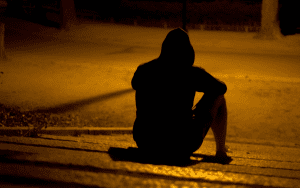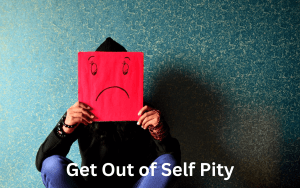How to Get Out of Self Pity? Using Introspection as an Antidote to Self Pity
 If you frequently wonder, “Why does everything bad happen to M.E.?” The possible sensation of sadness for oneself. However, through Introspection, we can get out of self pity. When things go tough, many individuals start feeling sorry for themselves. Those who indulge in self-pity focus excessively on their own problems. You have a case of self-pity.
If you frequently wonder, “Why does everything bad happen to M.E.?” The possible sensation of sadness for oneself. However, through Introspection, we can get out of self pity. When things go tough, many individuals start feeling sorry for themselves. Those who indulge in self-pity focus excessively on their own problems. You have a case of self-pity.
- Depression is sometimes misdiagnosed as self-pity. Living with depression might cause feelings of self-pity.
- Self-pity is a common sign of depression, but hopelessness, apathy, and a hollow sensation take precedence. You may feel sorry for yourself without actually being depressed.
- A bit of self-pity is standard, but dwelling on the past or worrying about the future might keep you from enjoying the present moment.
What is Self Pity, and How Can We Get Out of Self Pity
When we’re feeling down, it’s easy to wallow in self-pity, defined as a negative state of mind. For all that we go through, we have compassion for ourselves. This inwardly oriented melancholy might make us feel even worse or be interpreted as a cry for help.
Everyone experiences self-pity in their own unique way. Self-pity often leads people to think along these lines.
- No one likes you.
- You are a total bust.
- Poor fortune finds you.
- Everything is more challenging for you.
- Unfairness in life
- No progress can be made.
Whether or not you’re experiencing negative or automatic thoughts, the effort required to counter them can add up and lead to a downward spiral.
Not all forms of self-pity are negative. When horrible things happen, it’s natural to feel this way. Feeling sorry for yourself after a setback is normal if you don’t let those feelings continue forever. Although it’s OK to temporarily give in to negative emotions, doing so too often is unhealthy.
Introspection
Introspection is the process of analyzing one’s inner mental and emotional states. Introspection is grounded in studying one’s mental state in psychology. Still, it may also mean “examining one’s soul” in spirituality. In contrast to exterior observation, Introspection focuses on the individual inside.
For the most part, it grants unmediated access to one’s own mental state, making each person’s experience of the mind entirely unique. Introspection can be used to assess sensory, physical, cognitive, emotional, and other types of mental states.
The practice of looking inward has been the focus of philosophical debate for centuries.
Plato asked, “…Examine your thoughts patiently to understand your true feelings.?
” While Introspection may be used in many areas of philosophy, it is most commonly associated with the study of knowledge (epistemology), where it is contrasted to other methods of acquiring information such as sense data, logical analysis, personal experience, and witness accounts.
Isolation and Why it Affects Us
If you want to quit feeling sorry for yourself, the first step is to figure out what’s making you feel this way. Some typical causes of self-pity include:
- A lack of confidence and a sense that your life is spinning out of control are symptoms of low self-worth.
- When someone mistreats you or takes advantage of you, it can mess with your head. Standing up for yourself and letting others know you won’t tolerate that behaviour is essential. Everyone deserves to feel safe and respected. They think they have no value and the world is out to get them.
- Grief: The pain of profound melancholy is so intense that we can’t help but feel compassion for ourselves.
- Feelings of inadequacy: when we fail, it’s simpler to blame others than ourselves.
- It’s hard to accept illness or persistent pain when everyone else appears to be doing well.
- Loneliness: When we don’t feel connected to anybody else, it’s easy to wallow in our own misery.
- Some of our doubts and fears may originate in the imposter syndrome, the sensation that we don’t belong in the world. We may overcome this unreasonable fear of being found out as a fraud by working to strengthen our abilities and self-assurance.
The damage that self-pity does.


1. Restricting Oneself
It’s clear that we’re letting our self-pity get in the way of our success when we make remarks like these. We’ll get used to hearing people tell us we’re not worthy of trying. Eventually, it won’t even bother us. Instead of taking chances and making an effort, we wallow in sloth. Relentlessly feeling sorry for ourselves prevents us from reaching for the stars.
Be wary of the ideas portraying us as brave warriors facing a hostile cosmos that wants nothing more than to bring us down. In this way, our self-pity might masquerade as righteousness, lulling us into a false sense of security.
As a substitute for success and effort, we try to console ourselves with the story of our remarkable and unique suffering. Again, this fabrication is designed to keep us from feeling more disappointed in ourselves. As a result, we lose our drive to continue.
2. Being Selfish
It can dull our sensitivity to the plight of others around us. This kind of selfishness is subtle and challenging to identify. We are the ones who have been wronged, after all. But if we see ourselves as victims, we are more inclined to stop caring about the needs of others or to place less importance on them.
Injustice affects everyone, and it’s impossible to tell whose personal struggle deserves sympathy. Being the victim always prevents us from letting others have their trials and tribulations. Self-pity might lead us to feel envious and resentful of what we believe other people have that we don’t.
3, Disappointment and Resentment
It frequently goes hand in hand with resentment and animosity for those who have done nothing to earn it. Rare is the person who feels sorry for themselves without simultaneously criticizing and being angry with others. Neither the targets of our rage nor we, the furious ones, come out of it with anything positive.
Doing so will cause others to share in our sense of misery. The victim mentality is contagious, and when we ignore the needs of others around us, we contribute to the problem. It’s not only us who will feel that the cosmos is uncaring and humanity is beneath us; now, everyone will.
Causes Harm to Their Bodies


Our mental and physical well-being are both negatively affected. One research from the 1990s found that “hopeless” people’s blood vessels hardened 20% more than those who didn’t feel that way — the equivalent of smoking 20 packs of cigarettes each day. Feelings of victimhood often lead to rage,
“Avoiding this factor can significantly decrease your chances of experiencing cardiovascular disease and stroke. Take control of your health today and make the necessary changes to live a longer, healthier life.”Adverse effects on our physical health might be compounded by the mental anguish and sadness that can result from wallowing in self-pity regularly.
Comparison of Self-Pity and a Victim Complex
Self-pity may make us feel we’re helpless victims of life’s unfair dealings, which might drive us to develop a victim mentality. Self-pity, however, is rarely permanent and straightforward to get over. Those who think this way believe misfortune will follow them wherever they go.
Psychologists think that victim mentality develops subtly as a defence mechanism against trauma, making overcoming it more challenging. They are victims of chance and circumstance and are caught up in difficult situations through no fault.
The psychological syndrome known as “learned helplessness” affects many people who have suffered trauma. We are conditioned to feel helpless and despondent about the future without realizing it.
No matter how hard we try, we can’t seem to change our destinies, which adds to the growth of helpless attitudes.
This despair is ordinary to both self-pity and victim mentalities; both are reactions to the anxiety and pessimism triggered by circumstances outside one’s control. Self-pity is a coping technique that reinforces the feeling that nothing will change, regardless of our events.
Self-pity can be transformed into self-empowerment, a developed attitude may be adopted, and self-defeating habits can be unlearned.
Sadness vs. Self-Pity
While poor self-esteem and lack of drive are common to both self-pity and depression, they are not synonymous.
Depression is a widespread but significant mood disease that has far-reaching effects on an individual’s ability to function in society. Chemical imbalances are the most common cause of depression, while unfavourable life events can also play a role. Self-pity is a common symptom of depression, which you may be experiencing yourself if you’re depressed.
And what, exactly, does self-pity signify for you?
Visit of a mental health professional. If factors other than self-pity negatively affect your mental health, seek help.
Signs and Symptoms of Self-pity


Since self-hatred isn’t technically a medical disorder, it’s difficult to describe what it feels like in concrete terms. Self-loathing and self-hatred might be hard to recognize. However, there are several common warning signs:
- Depression
- Anxiety in Social Situations
- Self-esteem problems
- Depression and a sense of futility
Anxiety-inducing attempts to keep loved ones from deserting you
relationships that are both passionate and prone to swing wildly between extremes of love and loathing; a sense of self constantly shifting, whether in terms of values, professional path, circle of friends, or sexual orientation; and so on.
- Harmful actions are taken on the spur of the moment, such as alcohol or drug abuse, sexual encounters, reckless driving, or excessive eating.
- Acts of self-harm and, for some, suicide ideation or attempt
- Short-term (a few hours to a few days) episodes of severe emotions like depression, irritation, or anxiety.
- feeling hollow all the time
- furious rage
- Having a hard time keeping your cool
- Sensations of profound disconnection or detachment.
- Having paranoid thoughts because of stress
The presence of borderline personality disorder symptoms is not limited to one setting. They don’t make sense given the person’s age or social status and aren’t caused by substance abuse or illness alone.
A few more indicators exist but don’t necessarily indicate internalized shame. They are, instead, associated with excessive self-criticism that might develop into self-hatred.
- Guilt when things don’t go as planned
- Perfectionism
- Self-harm
- Disorders of eating
Distressing Feelings
After enduring emotional stress, a person’s everyday emotional state may be more difficult to regain, and they may feel their emotions more powerfully and for longer.
The individual may also experience extreme fury or trouble keeping their temper. As a result, the affected individual may experience negative emotions like guilt or shame. Anxiety over being ignored, uncared for, or abandoned is a common trigger for this fury.
Another typical sign is engaging in self-harm. People with BPD may do this to calm their nerves, exact revenge on themselves, or vent their most profound anguish.
Recurrent thoughts of suicide are another sign of BPD. Some people even try to kill themselves. People with BPD are likelier to damage themselves or take their own lives.
Humans can develop emotional resilience. Lessen the frequency or intensity of self-harming behaviours and suicidal thoughts if they receive appropriate therapy.
Actions Taken on Impulse
Impulsive actions are also every day among those with borderline personality disorder.
- dangerous sex encounters
- Misuse of substances
- misuse of funds
- gambling
- Dangerous driving
- Excessive eating
- Another common symptom of boredom is an incessant need to keep busy.
Conflict in Relationships
Relationship patterns for people with self-pity tend to be very passionate or unstable. This may entail a change in attitude described as devaluing what was once held in high esteem.
Attempts to prevent actual or perceived desertion are a common theme in relationships. The fear of abandonment can profoundly affect a person’s sense of self, emotional state, mental state, and actions.
For instance, the individual may experience anxiety or anger when separated from someone they care about, even temporarily.
Causes


Most self-hating behaviours start in childhood, making the past a prime source of self-loathing. In particular, they originate in the bond you shared with your parents or primary carers as a child.
These are the first interactions we form, and they have the potential to shape our outlook and behaviour throughout our lives. Having parents who are overbearing or aggressive can hurt a child’s self-image and confidence.
- Parents who promote independence and tolerate failure are said to instil their children with greater confidence. Instead, an overprotective parent might foster low self-esteem that can develop into self-hatred.
- In particular, studies show that young toddlers tend to project their own feelings onto the furious caretaker. As a result, the kid may begin to feel the same wrath, fear, and other unpleasant feelings that the parent is experiencing. Therefore, we are constantly exposed to circumstances that leave us miserable and unworthy.
- Finally, remember that kids might pick up self-hatred habits from their parents even if they weren’t directly exposed to the problem. Suppose a youngster sees their parents going through periods of self-loathing. In that case, that child is more likely to experience self-loathing.
- Genetics
- Studies of identical twins reveal that SP is heritable at a rate of more than 50%.
- Having a close family member with a mental illness, such as bipolar disorder, depression, addiction, or antisocial personality disorder, is common among those who suffer from SP.
Aspects of the Natural World
Many persons with SP have trauma histories, such as abuse or abandonment as children, violent arguments, or unstable relationships.
It has been estimated that as many as 70% of persons with SP were victims of childhood maltreatment, such as physical or sexual abuse or neglect.
Brain-Related Variables
Some research brains of persons with SP have been shown to differ structurally and functionally from those without the disease, particularly in regions involved in emotion regulation.
However, whether these variations were preexisting risk factors or emerged due to the illness is unknown.
Strategies to Get Out of Self-Pity


1. A Daily Mantra
A daily mantra can help keep illness at bay. It doesn’t surprise me that this maladaptive emotional state is linked to a hardening of the arteries; I’ve seen that my heart hardens to the world when I wallow in pity or feel like a victim.
To keep our protective barrier of justifications and scapegoating upheld, we blind ourselves to the positive. Self-compassion is an essential component of the remedy.
Self-compassion is a far more mature response to our difficulties. Please recognize that the world is frequently unfair. Challenging people may and will bring us down.
Sometimes we need to go hide out and suck our wounds. Instead of viewing the world as unkind and yourself as inadequate, choose to send yourself some love. The ultimate remedy, if you will.
Use “I am worthy, valuable, and deserving of love” as a mantra to tackle challenges. Likewise, scientific evidence supports this view. Mantra meditation strengthens and calms the body, making our hearts and blood vessels more pliable.
It is crucial that, when we repeat these mantras, we keep our attention on the good sensations they evoke.
To find fulfilment and joy in life, we must first learn to have compassion and understanding for ourselves.
2. Discover the Positive
Practice thankfulness by focusing on the positive and using our gratitude list. Recording a few positive experiences daily can help us break free of the victim mentality and see the world more optimistically.
Replace the negative tape that constantly plays in your head, telling you you’ll never amount to anything. Whether it’s the one buddy who always texts you or the park near your house with gorgeous trees, it’s essential to take the time to be clear that there are beautiful things in your life.
You have the power to choose either self-pity or thankfulness. This is something you can do when you have a little downtime. You don’t even have to write lists.
Still, if you make it a practice to think about and appreciate the positive aspects of your life and the advantages you’ve been given, you could realize that the odds weren’t stacked against you.
3. Being Present


Be present in your mind. You’ve probably heard this before and tried it. Although mindfulness is a problematic practice to sustain, it has been widely accepted in psychology and science that doing so may lead to profound personal growth.
Remember that we fell prey to self-pity because, at first, it felt nice. The justifications help us feel better about ourselves and the world around us. Still, they also distort our perception of reality. All of this is happening under the level of conscious awareness.
However, we may understand that we are merely creating a tale to make ourselves feel better and prevent us from risking failure if we can slow down and relax the mind enough to shine the spotlight of our attention on our thoughts and feelings objectively.
This insight will allow us to tell ourselves more uplifting tales and break the pattern sooner.
4, Put an End to Your Self-Comparisons
Put an end to your constant self-evaluation. We picture other people’s lives, as interesting as our own may be, unless we are really resilient individuals who have engaged in highly prolonged, in-depth interactions with a wide variety of people.
Our inferiority complex is always at work, trying to convince us that our lot in life is the worst possible. Suppose you indulge in bitter dreams about how easy their lives are. In that case, it is essential to remind yourself that this is merely a self-destructive cycle.
Get into the habit of using these four remedies and watch for the signals that you’re sinking into a hole of self-pity. If you succeed, you’ll see an increase in strength, wellness, and energy.
You’ll gain confidence, become more selfless, and finally be able to appreciate the wonders of life and the people in it that you’ve been covering up. It’s a constant hassle, but it’s well worth it.
5. Show Your Appreciation


Counting your blessings is a potent antidote to wallowing in self-pity. Being grateful for what you have in life might help you stop moping about and start appreciating the good things happening.
List three daily things you’re thankful for to create your gratitude diary. Not only does this exercise help you see things from a new angle, and encourages you to focus on the blessings in your life rather than the problems.
Your feelings of self-pity will gradually fade as you make thankfulness an integral part of your daily routine. Being more appreciative in everyday life leads to the sentiments mentally strong individuals recognize.
6. Be Confident in Your Abilities.
It’s not uncommon to throw a pity party for oneself when we feel inadequate or defeated by our limitations. In response, consider what makes you unique and what you do well. Spend some time thinking about and writing down your greatest strengths.
Recognizing that everyone has special skills and praising them may help you overcome feelings of inferiority and gain confidence. People with robust minds shun Introspection about their flaws.
Seek opportunities to put your abilities to use as you gain insight into them. Seek for situations where your skills and abilities may be put to use. Putting the spotlight on the good things about yourself may do wonders for your confidence and overall sense of well-being.
Focusing on your strengths can make you feel better about yourself and give you more energy to pursue your ambitions. Concentrating on what you’re good at will help you live a happier, more genuine life in the long run.
7: Aim For the Stars, But be Practical.
The sensation of being unable to go forward in life might lead to feelings of self-pity. Setting objectives that are both challenging and feasible will help you overcome this.
The obstacles you face in life are unavoidable. Start by taking stock of where you are now and making a list of what needs work. To achieve these lofty goals, break them down into more attainable subgoals. Feelings of self-pity might be lessened if one takes the time to create a plan for achieving those goals.
Be kind to yourself as you progress towards your objectives, and remember to reward yourself sometimes. Giving yourself praise and acknowledgement for your efforts may boost your confidence and inspire you to keep going.
It’s also important to remain flexible regarding your objectives since your situation may shift or new chances present themselves. Being adaptive and relaxed in your goal-setting can help you overcome feelings of pity and instead concentrate on building a life you love.
8, Seek the Help of Those Close to You.
Reaching out to loved ones for comfort and validation is essential when feeling alone and lonely due to self-pity. Friends and relatives may make you feel more supported and offer advice and perspective during difficult times.
If you feel sorry for yourself, don’t bottle it up inside; talking to trusted friends and family members about your feelings will help you gain perspective and strengthen your relationships.
If you’re having trouble finding the emotional support you need from the people in your immediate circle, consider joining a support group or attending community activities.
Having supportive friends and family can make you feel less lonely and alone and boost your confidence. People who believe in you and cheer you on may help you overcome feelings of pity and propel you toward progress and fulfilment in life.
Help from others may be essential to overcoming your problems and moving on with your life.
Introspection or Self-Compassion, the Antidot


What can you do to fix the situation?
When we get that “poor me” sensation, many (if not most) of us immediately start berating ourselves. In other instances, we tell ourselves fiercely to stop. Put an end to your self-pity! Sometimes, it’s less intense. Is there anyone who hasn’t spoken such words to themselves on a Monday morning?
“Come on,” they could be saying to themselves. Quit griping.
Is there really no need to whine?
This is a very reasonable and frequently appropriate response to such emotions. However, it is only sometimes effective. If it doesn’t work, there are other methods to try.
Self-compassion is a powerful remedy for feeling sorry for oneself. Self-pity is nearly complicated to experience if you are practising genuine self-acceptance and self-compassion.
It’s a strange paradox that self-reproach for doing something we disapprove of seems “natural,” yet self-compassion feels “weird.” However, give it a go.
Instead of being more challenging on yourself while you’re going through a bad period, try telling yourself gently, “This really is a tough time I’m going through.” Then, pay attention to how your muscles loosen and your breathing lessens.
People worry that self-compassion equals “coddling” oneself, leaving them “soft,” unable to handle adversity. However, encouraging kindness towards oneself should not exclude pushing your limits.
Self-compassion allows you to be honest about your flaws and shortcomings, accept them, and seek to improve them. Self-compassion makes it much easier to accomplish it.
Learning to Be Kind to Oneself


When you practise self-compassion, you split yourself in two, psychologically speaking: one “you” is the compassionate one, and the other is the human receiver.
To enhance this facet of self-compassion, there is a highly effective practice you may apply when experiencing a very unpleasant “woe-is-me” moment. In particular, you may show kindness to the aspect of yourself sharing all of the distress.
You can acknowledge that you are more than the profoundly uncomfortable sensations and ideas currently demanding your attention, rather than getting caught up in the terrible feeling or striving to “rise above” it.
You are more than the sum of your experiences; you haven’t always been in this awful mood.
In the same way that the sun may be obscured by clouds, you have a more stable aspect of yourself that you can tap into to recognize, accept, and show compassion for the suffering part of you without becoming overwhelmed by it.
In This Way:
Focus first on the internal anguish you’re experiencing rather than replaying the “story” of what transpired in your head (including who was to blame, what you should have done, etc.).
Next, try to picture the part of you that is “carrying” all those pitiful emotions as just that—a part of you, although a significant one. Visualize that facet of yourself in front of you if it helps.
So, tell yourself and this part of you that whatever is upsetting you is, in fact, wrong. An honest “Wow, that really sucks” might be the kindest and most supportive thing to say to someone going through a bad time.


Don’t try to talk yourself out of your inner sorrow’s raw, exposed crumminess right now; it won’t work. Relax and give yourself a break. Maintain a state of calm, openness, and tenderness towards your wounded self inside. You may even place your hand over your heart.
Being kind to oneself might be challenging. That’s OK. Just keep it in mind and function as best you can. It’s understandable if you want someone else to listen, care, and soothe you this way. That’s fine, too, but imagine yourself as this person. And the answer is yes, you can!
When giving oneself this kind of encouragement, it’s essential to keep your emotions apart from any assertions you make about how things actually are.
It might be incredibly comforting if someone says, “You feel alone like everyone is against you,” and they mean it.
However, being told that “you feel bad because everyone hates you,” as though this is undeniably true, will likely worsen your mood. When conversing with oneself, evaluating whether the words used are beneficial is essential.
You’ll feel better, less self-rejecting or self-pitying, more adaptable and able to problem-solve, and more self-accepting and open to others if you’re kind to your inner suffering self.
Test out your newfound freedom to connect with people. The fact that you are human means that you are susceptible to the same kinds of problems that everyone else in the species faces.
It’s a universal law that always has more potential adverse outcomes than positive ones. It’s a marvel that worse things don’t happen to helpless, defenceless beings like ourselves.
It’s essential to not fall into the trap of thinking things like “This shouldn’t have happened,” “This shouldn’t bother me,” “I should have been able to see this coming and prevent this,” or, worst of all, “I deserve this” when things go wrong, whether slightly or severely. Instead, try telling yourself, “Yep, this really does suck!” in the most supportive and sympathetic way you can muster.
So, let it sink in for a second. Ingest this reassuring message from you to you: it’s acceptable to feel weak, incapable, and out of control of your life right now since you’re a human being, and we all are.
- Feel the effects of it on your body.
- Do you unwind a little bit?
- Do you feel a modicum of relief?
- Is there a sense of gentleness, of (acceptable) sadness?
- Or even cause you to grin a bit sheepishly to yourself?
Whatever it is, take a few deep breaths to savour the sensation. After that, straighten your back and go on.
Taking Care of Your Own Self-Hate


Some universal ideas benefit everyone going through a low point in self-esteem. If you follow these principles, you don’t need treatment; you’ll be better off without it.
- Think of yourself as an objective observer of your own mind. As we’ve shown, mindfulness practices may train you to observe your mental processes without judgment. You’ll be able to identify and understand the roots of your self-hatred, which is the first step towards ending it.
- Modify your inner monologue. We are often our worst critics, constantly telling ourselves we are stupid or ugly. Instead, pretend you’re chatting with an old pal who’s been there and done that.
- Your expectations are too high. When you hate yourself, you tend to compare yourself unfavourably to others, which leads to low expectations and unachievable ambitions. Increase your sense of accomplishment and decrease your feelings of hatred by creating goals that are both reasonable and manageable.
- Just try to settle for mediocrity. The pressure to be flawless is real, but so is the freedom to be critical, furious, and incorrect. Accept these feelings instead of rejecting them, and realize it’s alright to be mediocre occasionally.
- Encourage oneself with uplifting words. Saying something encouraging to yourself daily is a terrific method to rapidly increase your confidence. Give yourself a pat on the back for finishing the chores or the schoolwork you dreaded doing.
Strong Minds Keep Themselves From Wallowing in Self-Pity.
The only thing a pity party will accomplish is making you feel worse about your situation, whether it be the failure to consummate a large deal or the impending deadline.
Dwelling on one’s misery can indeed lead to negative behaviour. It prevents you from moving past challenges and difficulties.
Mentally robust individuals reject the notion that they owe it to themselves to wallow in self-pity.
They view the difficulties they will inevitably face as opportunities to improve themselves and become more resilient. Here’s how emotionally robust individuals might avoid the pitfall of self-pity:
1, Deal With Their Emotions.
Grief, sadness, and loneliness are feelings mentally strong individuals face head-on. They don’t avoid feeling what they feel by telling themselves their troubles aren’t fair or that they’ve had it worse than others. They have learned that pushing through the pain is the best strategy.
2. They Are Aware of Downward Spiral Warning Signs


The more you dwell on the unpleasant aspects of your life, the more pessimistic you become. And staying on those negative ideas will hurt your actions. Feelings of pity are reinforced by the destructive cycle of thinking negatively and doing nothing.
Strong-minded individuals know the warning signs of this downward spiral and take preventative measures to avoid a life of misery. Self-pity is a waste of time for persons with influential minds.
3. They Are Unsure About What They Are Seeing
How we feel colours our perception of the world. If you feel sorry for yourself, you’ll only see the negatives and overlook the positives in your life. Strong-minded individuals often doubt their own perceptions.
- Sometimes, they wonder, “Is my luck always bad?”
- or “Has my whole life been ruined?”
They may tell whether their viewpoint is unrealistic by asking themselves these questions. This helps individuals form a more accurate understanding of their predicament.
4. They Conduct Behavioural Experiments Based on Their Worst Fears
Positive thinking may develop into a self-fulfilling prophecy, but mentally strong individuals know better. Instead of saying things like, “I could never put on a presentation as good as this one,” they exclaim, “Challenge accepted!” when they have thoughts like that. They conduct tests in the hope of disproving their pessimistic assumptions.
5. They Set Aside Money for Useful Tasks
Every minute you wallow in self-pity, you lose a minute of potential progress towards a remedy. The mentally robust don’t squander their limited mental resources moping over their sorrow. Instead, they focus their limited resources on worthwhile endeavours to improve their lives.
6. They Always Try to Be Thankful
One cannot have both self-pity and appreciation simultaneously. Self-pity is the belief that “I deserve better. ” In contrast, thankfulness involves the realization that “I have more than I need.” People with robust minds know the myriad things they should be thankful for, even the simple pleasures of clean water and air.
7. They’re Good Samaritans
When you’re helping other people, it’s hard to feel sorry for yourself. When considering the plight of those without food and shelter, issues like demanding customers and falling sales appear less significant. Strong-minded people don’t wallow in their personal miseries but instead work to make the world better for everyone.
8. They Won’t Complain
Feelings of self-pity might be exacerbated by sharing the details of your woes with others. People with solid minds don’t whine about their problems to make others feel sorry for them. They either take steps to improve or accept what they can’t alter.
9. They Keep a Positive Attitude
Specific issues in life are neither avoidable nor solvable. Most individuals will, at some point in their lives, experience difficulties like the death of a loved one, a natural disaster, or a severe health problem. Mentally robust people believe in themselves and their capacity to deal with life’s challenges.
Strengthen Your Mind
Building one’s mental power is analogous to doing the same for one’s body. You need to form healthy routines, like lifting weights, to have a robust body. But you would also have to break certain negative habits, like bingeing on sweets. Developing one’s mental fortitude necessitates the adoption of healthy routines, as well as the abandonment of vices like self-pity.
Everyone has the potential to fortify their mind. You may strengthen and improve by learning to control your thoughts, deal with your emotions, and act constructively no matter what life throws.

FAQs
How can we get past our feelings of pity for ourselves?
Ignoring Your Feelings of Pity
- They Confront Their Emotions….
- They’re Aware of the Danger Signs That Precede a Decline…
- They Are Doubting What They Think They Know…
- They conduct experiments on themselves based on their pessimistic assumptions.
- They Save Their Energy for the Good Stuff…
- Gratefulness is a daily habit for them.
- They’re Good Samaritans.
How can feeling sorry for oneself hurt one?
According to Mores, dwelling in the past is detrimental to one’s sense of self-worth in the present and future. Someone who wallows in self-pity misses out on the chance to choose happiness because they are preoccupied with all the negative things in their life.
Have we evolved to feel sorry for ourselves?
Self-pity is a natural human emotion, so feel free to host a pity party for yourself if you feel the need. Like every other celebration, this one will come to an end.
Does self-pity serve any purpose?
Self-Pity’s Double Edge: Recognising Its Therapeutic Value…
Sadness for oneself as a result of one’s own perceived misfortune is known as self-pity. As a method of dealing with stressful situations, it helps by refocusing attention inside, away from the problem at hand.
Why do people feel sorry for themselves?
When a person blames circumstances outside their control for their setbacks, they are more likely to experience feelings of self-pity. Self-pity has a substantial interpersonal component, despite its primary focus on the self and one’s own feelings.
Does manipulation rely on self-pity?
There are two main causes of feeling sorry for oneself. Manipulation of feelings comes first. To manipulate people and obtain what we want, we resort to the use of self-pity. Whether you recognise it in yourself or another, that’s immaturity, and you have to deal with it.
Provide an illustration of self-pity.
- Intense emotional responses; a loss of composure.A failure to appreciate one’s resources.
- Having trouble understanding other people’s perspectives.Deficit in initiative.
- Resignation to FateHaving a poor outlook on the past and being angry about it.
How can one stop wallowing in self-pity?
Seeking out ways to aid others is one way out of this rut. Finding methods to encourage others may quickly pull you out of a funk of self-pity. When you dedicate yourself to making other people happy, you have less time and energy to dwell on your own misery.
The antidote to self-pity is…
The polar opposite of self-worth is self-pity.
If you are interesting in more exciting articles click here,




